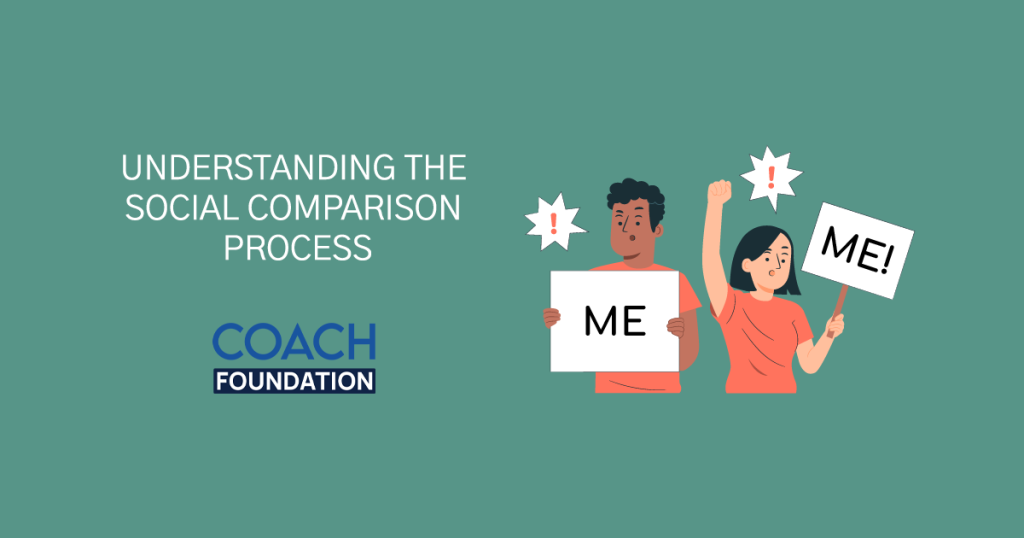Blog » Coaching Models and Techniques » Understanding The Social Comparison Process
Understanding The Social Comparison Process
The social comparison process is a cognitive process that involves comparing oneself to others. This process can occur both consciously and unconsciously and can have both positive and negative effects on individuals. Social comparison can lead to feelings of superiority or inferiority, depending on the comparison standard, and can influence self-esteem, self-worth, and motivation.

Understanding the social comparison process can help individuals recognize and manage the negative effects of social comparison. This includes envy and self-doubt and promotes positive effects, such as self-improvement and personal growth.
In this blog, we’ll explore:
1. What is the social comparison theory
2. How does social comparison theory work
3. Core Concepts of social comparison theory
4. Factors Influencing the Social Comparison Process
5. Application of social comparison theory to Life Coaching
So, let’s get started!
What is the Social support theory
Social comparison theory suggests that individuals evaluate themselves by comparing themselves with others to determine their own abilities, opinions, and social standing.
Social comparison theory is a psychological theory proposed by psychologist Leon Festinger in 1954. The theory suggests that individuals evaluate themselves by comparing themselves with others to determine their own abilities, opinions, and social standing. This comparison can be either upward when individuals compare themselves with those who are superior to them or downward when individuals compare themselves with those who are inferior to them.
According to the theory, social comparison is driven by the need for accurate self-evaluation and a desire for self-enhancement. Individuals tend to make upward comparisons when they are motivated to improve themselves and downward comparisons when they are seeking to feel better about themselves. Social comparison can also influence attitudes and behaviors, as individuals may change their opinions or behaviors to align with those of the group they are comparing themselves with.
The theory has been applied to various domains, including health, education, and advertising. For example, individuals may compare their health behaviors with those of others to improve their own health.
Similarly, students may compare their grades with those of their peers to determine their academic abilities. Advertisers may use social comparison to persuade individuals to purchase their products by highlighting the superior qualities of their products compared to those of their competitors.
Check out this video to learn more about Social Comparison Theory!
How the social comparison theory works
The social comparison theory suggests that humans have an innate tendency to compare themselves to others to evaluate their own abilities, opinions, and overall worth. Social comparison can occur both upward, where individuals compare themselves to those they perceive as superior, and downward, where individuals compare themselves to those they perceive as inferior.
For example, let’s say a student is preparing for an exam. They may compare themselves to their classmates, whom they perceive as being smarter or more studious. This upward comparison can motivate the student to work harder and perform better.
On the other hand, if a student compares themselves to a classmate who they perceive as less intelligent or hardworking, this downward comparison can boost their self-esteem and make them feel better about their own abilities.
Similarly, a person may compare their physical appearance to that of celebrities or models in magazines or on social media, which can lead to feelings of inadequacy and low self-esteem. However, comparing oneself to others who may have physical disabilities or limitations can result in a positive self-image.
Overall, social comparison theory suggests that people use social comparisons as a way of evaluating themselves and their place in the world and that these comparisons can have both positive and negative effects on their self-esteem and motivation.
I went through this intriguing article explaining the workings of social comparison theory, and I would suggest the readers go through it once!
Core concepts of social comparison theory
Like I said before, the social comparison theory suggests that humans have an innate tendency to compare themselves to others to evaluate their own abilities, opinions, and overall worth. The theory is based on the belief that individuals seek to understand themselves and their place in the world by comparing themselves to others. Below are the core concepts of social comparison theory.
Upward social comparison
Upward social comparison is when an individual compares themselves to someone who is perceived as better than them in a particular area.
For example, if someone who is just starting to learn to play tennis compares themselves to a professional tennis player, they are engaging in upward social comparison.
This type of comparison can motivate individuals to improve themselves, but it can also lead to feelings of inadequacy and low self-esteem if they perceive the gap between themselves and the comparison target as too great.
Downward social comparison
Downward social comparison is when an individual compares themselves to someone who is perceived as being worse off than them in a particular area.
For example, if someone who is struggling with their finances compares themselves to a homeless person, they are engaging in downward social comparison.
This type of comparison can boost self-esteem and create a sense of gratitude, but it can also lead to complacency and a lack of motivation to improve oneself if the comparison target is too far below one’s own level.
Check out the difference between upward and downward social comparisons in this video!
Temporal comparison
Temporal comparison is when an individual compares themselves to their past or future selves in a particular area.
For example, if someone who is trying to lose weight compares their current weight to their weight a year ago, they are engaging in a temporal comparison.
This type of comparison can motivate individuals to make progress and improve themselves, but it can also lead to unrealistic expectations or feelings of regret if the individual feels they have not made enough progress in the given time frame.
Factors that Influence the Social Comparison Process
The social comparison process can be influenced by various factors, such as social identity theory, self-esteem, individual differences, and contextual factors.
Social identity theory: It proposes that individuals derive their self-concept from their social group memberships. Therefore, people tend to make social comparisons with those who belong to their own group rather than those from other groups. For instance, a student may compare themselves to their classmates, rather than to students from another school.
Self-esteem: It refers to an individual’s overall evaluation of their worth or value. People with high self-esteem tend to make upward comparisons to boost their self-esteem, while those with low self-esteem tend to make downward comparisons to feel better about themselves.
Individual differences: including personality, age, gender, and culture, can also influence the social comparison process. For example, individuals who are high in extraversion may be more likely to make social comparisons than those who are introverted. Moreover, cultural differences may affect the type of social comparison individuals make.
Contextual factors: Factors such as the presence of others, feedback, and social norms can also influence the social comparison process. For instance, the presence of others may increase the likelihood of social comparison, as individuals tend to compare themselves to others in social situations. Feedback can also influence social comparisons, with positive feedback leading to upward comparisons and negative feedback leading to downward comparisons.
Learn about factors influencing the social comparison process in this article!
Applying Social Comparison Theory to Life Coaching
Social comparison theory can be applied in life coaching to help individuals gain a better understanding of themselves and their goals and facilitate their personal growth and development.
For example, a life coach may use upward social comparison to motivate their clients. By highlighting the achievements of successful individuals, the life coach can inspire their clients to set high goals and strive for excellence. This can be especially effective for individuals who are looking to improve their performance in a particular area, such as a career or sports.
On the other hand, a life coach may use downward social comparison to help their clients develop gratitude and appreciation for their own achievements. By highlighting the struggles and challenges of others, the life coach can help their clients gain perspective and feel more content with their own lives. This can be especially effective for individuals who are struggling with low self-esteem or feelings of inadequacy.
Moreover, a life coach can use temporal comparison to help their clients evaluate their progress and set realistic goals. By comparing their current performance to their past selves, the life coach can help their clients recognize their progress and identify areas for improvement. This can be especially effective for individuals who are working towards long-term goals, such as weight loss or financial stability. I
Conclusion
In conclusion, social comparison theory is a fundamental concept in psychology that explains how individuals evaluate themselves by comparing themselves to others. This theory highlights how social comparison can affect our self-concept, motivation, and overall well-being.
The process of social comparison can be upward, downward, or lateral, and a variety of variables like personality, culture, and feedback can affect it. Understanding social comparison theory can help individuals make more effective social comparisons and improve their self-awareness, self-esteem, and personal growth.
Share your insights to deepen understanding and spark engaging discussions. I’m eager to read your thoughts in the comments.
Frequently Asked Questions (FAQs)
What is the concept of social comparison theory?
Social comparison theory is a psychological theory that explains how individuals evaluate their own abilities and opinions by comparing themselves to others. According to this theory, people tend to make social comparisons to evaluate their self-concept and make judgments about themselves.
Social comparison can be upward (comparing oneself to those perceived as better), downward (comparing oneself to those perceived as worse), or lateral (comparing oneself to those perceived as similar).
What are a few examples of social comparison theory?
Here are a few examples of social comparison theory:
Weight loss: A person trying to lose weight may compare their current weight to that of others, such as celebrities or friends who have successfully lost weight, to evaluate their progress and set goals.
Academic performance: A student may compare their grades and test scores to those of their classmates to evaluate their own academic performance and determine their strengths and weaknesses.
Material possessions: An individual may compare their belongings, such as a car or house, to those of others in their social group to determine their social status and self-worth.
Who founded social comparison theory?
Leon Festinger, a psychologist, first proposed the social comparison theory in 1954. Festinger developed the theory to explain how individuals evaluate their own abilities and opinions by comparing themselves to others and how this process affects their self-concept and motivation.

ABOUT SAI BLACKBYRN
I’m Sai Blackbyrn, better known as “The Coach’s Mentor.” I help Coaches like you establish their business online. My system is simple: close more clients at higher fees. You can take advantage of technology, and use it as a catalyst to grow your coaching business in a matter of weeks; not months, not years. It’s easier than you think.
AS SEEN ON





